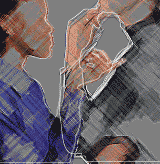

Différentes compréhensions de la communication par l’entremise d’ordinateurs
Social Interaction in Computer-Mediated Communication de Jong-Young Kim (2000)
Ce court texte présente les grandes approches de la communication par l’entremise d’ordinateurs. Il présente les trois théories de la communication par l’entremise de l’ordinateur les plus « populaires », et indique leur point de vue, entre autres, sur la « limitation » des indices sensoriels, l’anonymat et leurs effets envisagés sur la communication. Enfin, il tente de nuancer ces points de vue en introduisant la notion du contexte social, culturel et historique dans lequel les échanges sont effectués. De plus, il souligne l’importance du rôle actif de l’usager. Il s'agit d'une bonne introduction au domaine.
Comment exprimer son identité dans un univers où
l’on n'a pas de « corps »
Identity and Deception in the Virtual Community de Judith S. Donath (1998)
Un texte qui explore l’un des aspects très primordial de l’« existence », soit l’identité de la personne. Dans le monde de tous les jours, il est aisé de se définir en tant que « corps » et notre apparence en dit long sur notre personne; notre genre, notre habillement et notre tenue disent beaucoup à notre sujet. Dans le cyberespace, il en est tout autrement, le texte étant notre seul médium de communication; comment alors se différencier des autres, s’individualiser, définir son identité? Judith Donath s’est intéressée à cette problématique dans le cadre des serveurs de nouvelles (newsgroups). Elle s’intéresse aux façons d’élaborer son identité dans un univers limité aux lettres et à certains modes de communication sociale. Ce faisant, elle nous présente le monde des serveurs de nouvelles sous un angle ethnographique.
Communication limitée ou communication améliorée?
Communicative Subtlety in Multimedia Chat de John Suler (1997)
Un petit article sympathique qui vient remettre en question
les conceptions selon lesquelles la communication par l’entremise
d’ordinateurs est une forme de communication « limitée ».
Plutôt que d’insister sur les restrictions que ce type de communication
porte aux indices physiologiques, l’auteur s’intéresse
aux nouvelles façons de s’exprimer par le biais des univers graphiques,
particulièrement le Palace. Indices sensoriels limités ou nouvelles formes
d’expression des émotions?
![]()
| Nous avons fait la sélection de
différents extraits de textes décrivant les particularités de
la communication par l’entremise d’ordinateurs. La plupart
de ces textes seront revus plus tard dans leur entièreté dans les
différentes autres sections du site. Pour l'instant, vous pouvez
vous contenter des extraits suivants.
Mis à la suite,
nous espérons que les descriptions faites par différents auteurs des phénomènes
liés à la communication par Internet vous aideront à mieux en saisir
l’essence. |
![]()
Caractéristiques de la communication par l’entremise d’ordinateurs
"Kiesler, Siegel and McGuire have described computer-mediated
communication as having four distinct features in comparison to conventional
forms of interaction: an absence of regulating feedback, dramaturgical
weakness, few social status cues and social anonymity. Conventional systems
for regulating interaction fall apart".
Dans : Electropolis: Communication and Community On Internet Relay Chat de Elizabeth Reid
"Emotes, emoticons and paralanguage are used to express
emotions and assist in the interpretation of message texts. The geographical
distance between users, absence of physical bodies, control over self-presentation,
and anonymity/pseudonymity characteristic of MOOs provide MOOers with
a perception of the MOO as a "safe" communication environment
where they are not judged by others, are not accountable to others, and
where their actions will have no "real life" consequences. This
results in communication that is high in self-disclosure, the rapid formation
of intense relationships, and disinhibited behaviour. These same factors
also provide a communication environment that is conducive to projection
and transference, misunderstandings and deceit".
Dans : "Social interaction in MOOs: Constraints and opportunities of a text-based virtual environment for interpersonal communication" de L. D. Roberts, L. M. Smith & C. Pollock
![]()
Anonymat, absence de risques et désinhibition
"This also contributes to what might be called a 'shipboard
syndrome', the feeling that since one will likely never meet anyone from
the MUD in real life, there is less social risk involved and inhibitions
can safely be lowered. (...) Another deeper reason, though, is that players
do not feel that very much is at risk. At worst, if they feel that they’ve
made an utter fool of themself, they can always abandon the character
and create a new one, losing only the name and the effort invested in
socially establishing the old one. In effect, a 'new lease on life' is
always a ready option".
Dans : Mudding: Social Phenomena in Text-Based Virtual Realities de Pavel Curtis
"The ease of social communication in text-based environments
was attributed to not being seen, not having to look the other in the
face, the perceived absence of judgement, and associated reduction in
performance pressure".
Dans : The social use of text-based virtual environments by shy individuals de L. D. Roberts, L. M. Smith & C. Pollock
 "Aspects of these virtual environments found to be conducive
to disinhibited behaviour were anonymity, geographical distance between
users, control over self-presentation, and perceived lack of "real
life" consequences for actions".
"Aspects of these virtual environments found to be conducive
to disinhibited behaviour were anonymity, geographical distance between
users, control over self-presentation, and perceived lack of "real
life" consequences for actions".
Dans : "Disinhibited behaviour in computer-mediated communication: the good, the bad and the ugly" de L. D. Roberts, L. M. Smith & C. Pollock
"The most widely reported finding from researchers who
have studied the interpersonal aspects of online interactions is the disinhibition
that occurs (Keisler, Siegel & McGuire 1984; King, 1995a; Reid, 1994;
Sproull & Kiesler, 1984; Sproull & Kiesler, 1995). The improbability
of any local, real life repercussions for on-line social activity produces
a new and poorly understood psychological phenomena; people feel free
to express themselves in an unrestrained manner. "If all computer-mediated
communication systems can be said to have one single unifying effect upon
human behavior it is that usage tends to cause the user to become less
inhibited." (Reid, 94)"
Dans : Internet therapy and self help groups - the pros and cons de Storm A. King
![]()
Ambiguïté dans les interactions
"Another effect of the typing delay (and of the low bandwidth
of the MUD medium) is a tendency for players to abbreviate their communications,
sometimes past the point of ambiguity. For example, some players often
greet others with 'hugs' but the 'meaning' of those hugs vary widely from
recipient to recipient. (...) This leads to some MUD interactions having
much more ambiguity than usually encountered in real life, a fact that
some mudders consider useful."
Dans : Mudding: Social
Phenomena in Text-Based Virtual Realities de Pavel Curtis
![]()
Projections
"Judgments of others in this virtual social setting,
made without the normal sensual clues, can consist of distorted, emotionally
laden projections (King, 1995a)."
Dans : Effects of Mood States on Social Judgments in Cyberspace: Self Focused Sad People as the Source of Flame Wars de Storm A. King
![]()
Impression de relations profondes
"Walther (1996) went on to argue that in some circumstances
participants in on-line communication could actually become more intimate
than they would of had they been in face-to-face communication. Following
Social Identity Deindividuation or "SIDE" theory (Spears &
Lea, 1992), he noted that on-line receivers are likely to over interpret
what little data they have and, when the data are positive, reach even
more positive conclusions about others than they would in face-to-face
settings."
Dans : "Making MOOsic": The Development of Personal Relationships On-line and a Comparison to their Off-line Counterparts de Malcom Parks & Lynne D. Roberts
![]()
Sécurité pour explorer les relations avec l’autre sexe
"A more likely explanation is that MOOs provide users with the perception of a "safe" environment for social interaction in which individuals can explore all types of relationships without fear of repercussions in their physical lives (Roberts, Smith & Pollock, 1996b). By the same token, the "real-time" give and take of a synchronous channel, along with the greater communicative subtlety possible on MOOs, may make it easier and more interesting for men and women to engage in dialogue-thus perhaps accounting for the greater proportion of cross-sex relationships in MOOs than in newsgroups."
"The text-only nature of MOOs, the physical distance between MOOers, and the anonymity provided by having a MOO character may further reduce the perception of "risk" associated with cross-sex relationships in the physical world. The fact on-line relationships were not well integrated with the participants’ off-line relationships may offer another dimension of safety. Friends, romantic partners, and other associates often challenge cross-sex friendships in "real-life" settings (Swain, 1992; Werking, 1997)."
Dans : "Making MOOsic": The Development of Personal Relationships On-line and a Comparison to their Off-line Counterparts de Malcom Parks & Lynne D. Roberts
![]()
Asynchronisme et flexibilité
"The asynchronous nature of email online support groups provides the additional advantages of "24 hour availability, selective participation in entering and responding to messages, anonymity and privacy, immediate and/or delayed responding, and recording of transmissions." (Sparks,1992)."
Dans : Internet therapy and
self help groups - the pros and cons de Storm A. King
![]()



